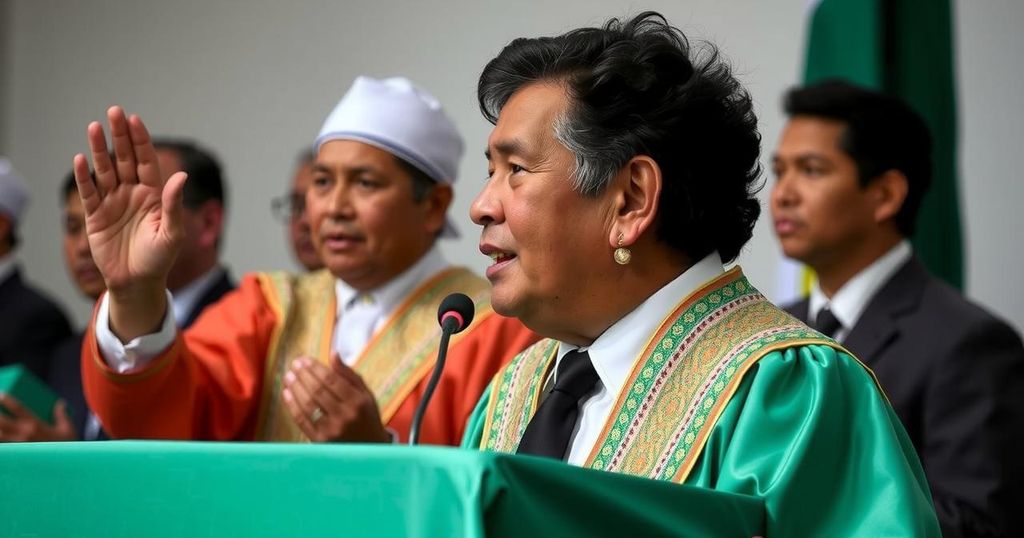Bolivia’s Judicial Elections: Lessons for Mexico’s Upcoming Reform

Bolivia’s judicial elections reflect a troubled democracy, where campaigning is technically prohibited but candidates resort to clandestine tactics to gain attention. This process is scrutinized amid dissatisfaction from voters, who often do not recognize the candidates. Former President López Obrador’s overhaul of Mexico’s judicial system echoes similar political motivations. The elections underscore the risks politicizing judiciary positions poses to democratic structures and serve as a cautionary tale for Mexico.
In La Paz, Bolivia, the recent judicial elections showcased unconventional campaigning methods despite a ban on campaign activities. Candidates covertly placed their images on snack packaging, indicating a struggle to connect with an uninformed electorate. Bolivia holds a unique position as the only nation to elect top judiciary members, a practice set to be emulated by Mexico following a contentious justice system overhaul led by former President Andrés Manuel López Obrador. President Luis Arce applauded the elections as a cornerstone of democracy, yet voters expressed disillusionment, deeming the process politicized and ineffective. Those casting ballots often struggled to identify candidates, with mandatory voting leading to frustration. Skepticism surrounds the electoral system introduced over a decade ago, which arguably has compromised judicial independence. Critics have contended that the politicization of judiciary elections poses substantial threats to democratic integrity across Latin America.
The current voting occurred amid heightened political tensions between Arce and former President Evo Morales, influencing the timing and nature of the elections. The Supreme Electoral Tribunal faced challenges affirming the legitimacy of the electoral process, with officials admitting widespread citizen dissatisfaction with the method of selecting judges. As Bolivia experiences its third round of judicial elections, prior low turnout rates reflect a populace disengaged from a system perceived as opaque and manipulated by political elites. Notably, the previous elections under Morales prompted significant voter discontent, culminating in an environment where the judiciary is wielded as a political tool.
Fears surrounding the integrity of electoral outcomes persist, stemming from Morales’ controversial attempts to extend his presidency after a failed 2016 referendum. His attempt resulted in a tumultuous political climate leading to his resignation and subsequent criticism of the judiciary he helped reform. Moreover, the conflicts over electoral legitimacy and judiciary control continue to shape Bolivia’s political sphere, with observers cautioning against replicating such a judicial election model in Mexico. The situation has caught the attention of Mexican authorities, keen on monitoring the ramifications of Bolivia’s elections on their justice system overhaul.
As the outcomes unfold, analysts are closely watching how these developments will impact both the Bolivian judicial landscape and Mexico’s forthcoming reforms, highlighting the intricate linkages between judicial independence, political power, and democratic integrity in Latin America.
Bolivia’s unique electoral system allows citizens to elect judges for the judiciary, a process that differs significantly from the conventional appointment systems seen in many countries. This practice, established more than a decade ago, was aimed at ensuring accountability and transparency in the judiciary. However, growing concerns have surfaced regarding the effectiveness of this approach, leading to questions about judicial independence. Political dynamics within Bolivia, especially tensions between current and former leaders, have further complicated the judicial system, illustrating broader themes of political manipulation and public disillusionment. The context of these elections is particularly important as Mexico prepares to initiate a similar judicial election process, prompting comparisons between the two nations’ approaches to judicial reform.
The recent judicial elections in Bolivia have reignited debates about the efficacy and integrity of electing judges within a politicized environment. While intended to enhance democratic participation, the process has led to significant voter apathy and criticism regarding the qualifications of the candidates. Political struggles between influential figures underscore how judicial elections can become entangled in broader power dynamics, raising doubts about their capacity to foster genuine democratic governance. With Mexico poised to adopt a similar voting system, international observers remain cautious as they analyze Bolivia’s experience and its potential repercussions.
Original Source: www.newspressnow.com








